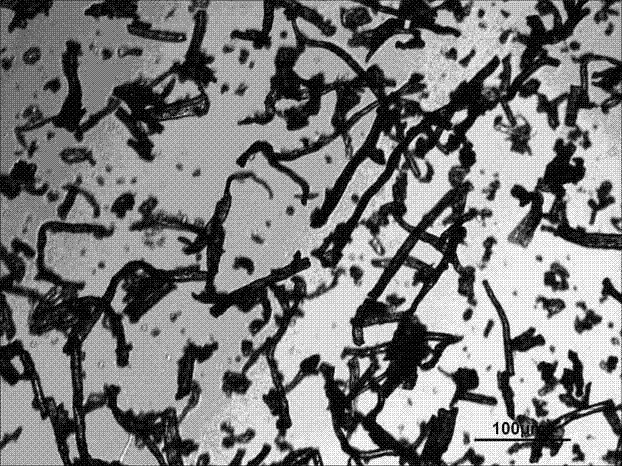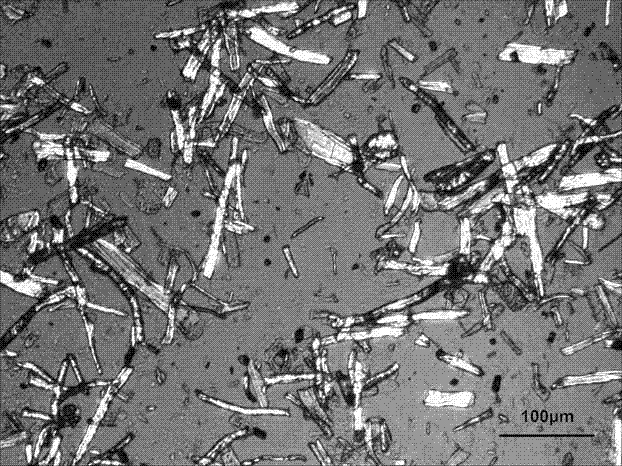Preparation method for pulp fiber-reinforced starch plastic
A pulp fiber and starch plastic technology, applied in the field of biodegradable plastics, can solve problems such as poor water resistance, insufficient strength, and limited application range
- Summary
- Abstract
- Description
- Claims
- Application Information
AI Technical Summary
Problems solved by technology
Method used
Image
Examples
Embodiment 1
[0023] The pulp fiber reinforced starch plastic is obtained according to the following method:
[0024] ① Cut 100 parts by weight of pulp fiberboard into small pieces, put it in a beaker, add 100 parts by weight of NaOH aqueous solution with a concentration of 15% by mass, moisten it for 0.5 hours, quickly add a little excess HCl to neutralize, and use No. 2 Sand core funnel suction filtration, then wash with distilled water until the pH is neutral, and dry;
[0025] ② Take another beaker, add 100 parts by weight of the above sample, and then add 100 parts by weight of 55% H 2 SO 4 Aqueous solution, heated up to 45°C, stirred at constant temperature, after 0.5h of reaction, filtered under reduced pressure, dried for later use;
[0026] ③ Add 5 parts by weight of the above-mentioned pulp fibers to 100 parts by weight of starch, and quickly mix them uniformly through a high-speed disperser, then add 15 parts by weight of a degradable plasticizer, and mix and disperse evenly ag...
Embodiment 2
[0028] The pulp fiber reinforced starch plastic is obtained according to the following method:
[0029] ① Cut 100 parts by weight of pulp fiberboard into small pieces, put it in a beaker, add 100 parts by weight of NaOH aqueous solution with a concentration of 20% by mass, wet it for 0.5 hours, quickly add a little excess HCl to neutralize, and use No. 2 Sand core funnel suction filtration, then wash with distilled water until the pH is neutral, and dry;
[0030] ② Take another beaker, add 100 parts by weight of the above sample, and then add 100 parts by weight of H with a concentration of 60% by mass. 2 SO 4 Aqueous solution, heated up to 50°C, stirred at constant temperature, after 0.5h of reaction, filtered under reduced pressure, dried for later use;
[0031] ③ Add 10 parts by weight of the above-mentioned pulp fibers to 100 parts by weight of starch, and quickly mix them uniformly through a high-speed disperser, then add 20 parts by weight of a degradable plasticizer, ...
Embodiment 3
[0033] The pulp fiber reinforced starch plastic is obtained according to the following method:
[0034] ① Cut 100 parts by weight of pulp fiberboard into small pieces, put it in a beaker, add 100 parts by weight of NaOH aqueous solution with a concentration of 25% by mass, wet it for 0.5 hours, quickly add a little excess HCl to neutralize, and use No. 2 Sand core funnel suction filtration, then wash with distilled water until the pH is neutral, and dry;
[0035] ② Take another beaker, add 100 parts by weight of the above sample, and then add 100 parts by weight of H with a concentration of 65% by mass. 2 SO 4 Aqueous solution, heated up to 55°C, stirred at constant temperature, after 0.5h of reaction, filtered under reduced pressure, dried for later use;
[0036] ③ Add 15 parts by weight of the above-mentioned pulp fibers to 100 parts by weight of starch, and quickly mix them uniformly through a high-speed disperser, then add 25 parts by weight of a degradable plasticizer, ...
PUM
 Login to View More
Login to View More Abstract
Description
Claims
Application Information
 Login to View More
Login to View More - R&D
- Intellectual Property
- Life Sciences
- Materials
- Tech Scout
- Unparalleled Data Quality
- Higher Quality Content
- 60% Fewer Hallucinations
Browse by: Latest US Patents, China's latest patents, Technical Efficacy Thesaurus, Application Domain, Technology Topic, Popular Technical Reports.
© 2025 PatSnap. All rights reserved.Legal|Privacy policy|Modern Slavery Act Transparency Statement|Sitemap|About US| Contact US: help@patsnap.com


